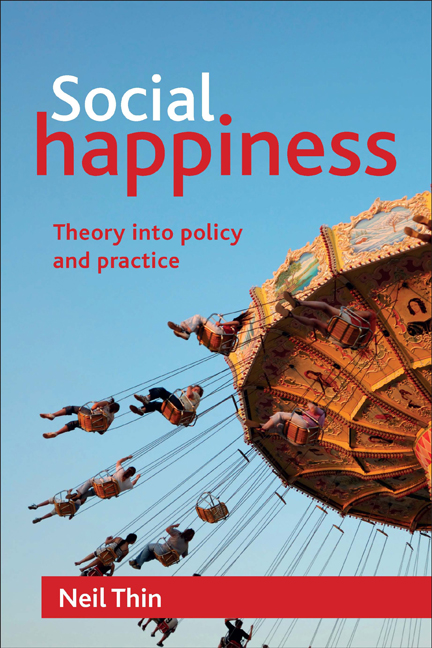one - Introduction: prosperity debates and the happiness lens
Published online by Cambridge University Press: 01 September 2022
Summary
‘A quantum of happiness’
Be happy while you’re living, for you’re a long time dead. (Scottish proverb)
Three core ideas underpin the current tide of enthusiasm for happiness policy worldwide: that happiness is what counts, that happiness should be counted, and that happiness can be improved. This book argues for stronger attention to a fourth, rather looser idea: that happiness is social – that it emerges from good social relations, from enculturation, and from fair institutions.
Lest any of these ideas seem so obvious as not to require research or explicit policy emphasis, it may help to start with a quick tour of the uneven development of these ideas since the Enlightenment. Different trajectories of similar ideas can be traced in many countries worldwide, but a convenient foothold in the modern history of happiness scholarship is offered by taking a quick glance at a handful of Scots who developed happiness theories in the 18th and 19th centuries, with extraordinary global effects. If this helps to dispel the popular image of a Scottish culture dominated by Calvinist dourness, so much the better.
The modern European version of the idea that happiness is what counts (and, just as importantly, that everyone counts as one) was first proposed by the Irish Scot Francis Hutcheson in the 1720s (1725). Against many potentially deadly religious fundamentalists and defenders of aristocratic privilege, he argued that the point of morality, and hence of governance, was to achieve the ‘greatest happiness for the greatest numbers’. This ‘utilitarian’ principle was much later taken up by Jeremy Bentham, Thomas Paine, Thomas Jefferson and many other European and North American moral and political philosophers and reformers. Whether or not we agree entirely with utilitarianism, it is hard to dispute the moral and political significance of basing our morality on the appreciation of everyone's happiness.At the time, it constituted a radically new argument for rational, fair, and empathetic governance. What it needed, but didn't get until late in the 20th century, was the support of systematic happiness scholarship.
Hutcheson's path-breaking work was followed by David Hume and Adam Smith, both of whom spread the idea that ‘sympathy’ – considering other people's (good or bad) feelings as if they were ours – is the ‘natural’ basis for our moral and political systems.
- Type
- Chapter
- Information
- Social HappinessTheory into Policy and Practice, pp. 3 - 32Publisher: Bristol University PressPrint publication year: 2012

